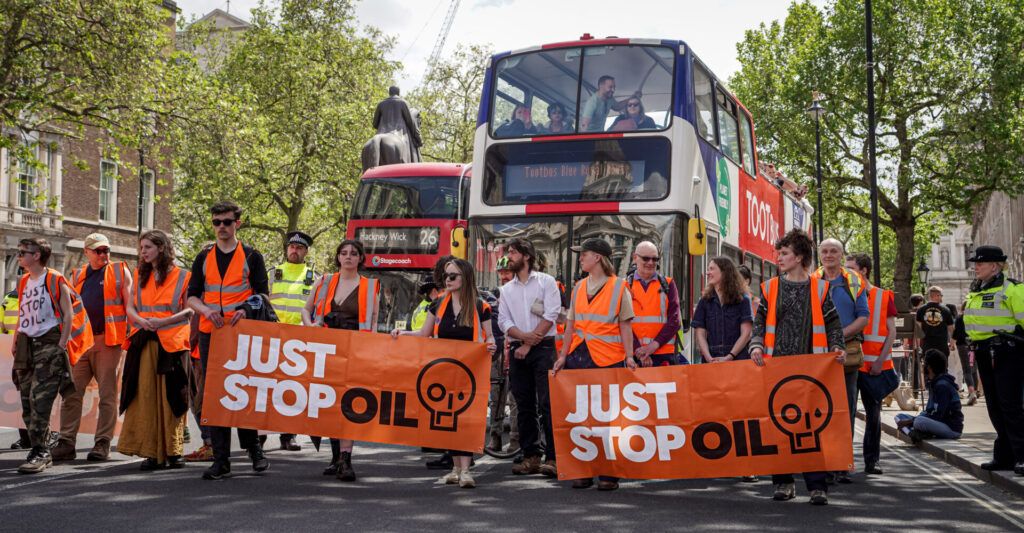In the UK, a dangerous escalation in the criminalization of climate protests
By Oscar Berglund | July 23, 2024
 Just Stop Oil activists protesting near Trafalgar Square on Saturday, May 20, 2023. (Alisdare Hickson/Wikipedia, CC BY-SA 2.0)
Just Stop Oil activists protesting near Trafalgar Square on Saturday, May 20, 2023. (Alisdare Hickson/Wikipedia, CC BY-SA 2.0)
Last week, record prison sentences were handed down to five British climate activists for organizing a multi-day protest on the M25, the motorway that goes around London. Four of them received sentences of four years each. The fifth, Roger Hallam, got a five-year sentence. These sentences are an alarming escalation in the criminalization of climate protests, in the UK and beyond.
The sentences are a direct consequence of a range of anti-protest legislation passed by the previous Conservative government that has been heavily criticized by human rights groups, the United Nations, and climate scientists. Some of these new laws are still being contested in UK courts by the human rights nongovernmental organization Liberty. The new laws have focused on policing, sentencing, and the ability of juries to find defendants not guilty.
On the policing front, the police now have much greater powers to stop protests when they take place, and to stop them from ever starting. In terms of sentencing, the sentences last week marked a watershed in the use of longer sentences, but there is scope in the new laws to give even more extreme sentences. In the courts, there have also been important changes that have made it much more likely to put non-violent activists behind bars. Possible lines of defense that protesters have previously used—such as claiming a necessity to act and having a lawful excuse for acting—have been restricted. The lack of such lines of defense has in turn motivated judges to keep defendants from describing their motivations in front of juries, thereby decreasing the likelihood that juries will acquit according to their conscience.
These developments have perversely led to a situation in which the climate crisis cannot be taken into account by courts when increasing numbers of climate activists are on trial. This removes the key part of the political puzzle in what climate activists see as political trials.
That the British judicial system seeks to remove the politics from the courtroom does not remove the politics from what brought the activists there in the first place. It’s worth taking a broad look at those politics to better understand these sentences.
The climate crisis is felt across the world, through extreme temperatures, floods, droughts, forest fires, and many other negative impacts. It is worth noting that if the world was to reach net zero in 2050 or 2060, which are the most common country targets, the world would continue to warm until that point. And as we are already experiencing climate crisis, the prospect of another quarter century of warming is daunting. National and international bodies dedicated to climate policy are increasingly desperate, pointing out that countries are nowhere near being on track to implement the policies that would help them reach those net zero targets.
A lot of people around the world are therefore, quite rightly, concerned and, quite rightly, lack confidence in governments to avoid the civilizational threats that the IPCC reports warn us about. It is this very rational and science-based desperation that motivates people to become climate activists. None of this type of reasoning is now permissible to take into account in UK courts.
Those who justify the unprecedentedly harsh sentences tend not to deny, but to ignore these motivations. They often say that people have the right to protest but not to disrupt.
It is of symbolic and political importance that the longest sentence was given to Roger Hallam. Hallam has been one of the most prominent and influential climate activists in Europe in recent years. He was a co-founder of Extinction Rebellion and the architect of its civil disobedience tactics. He then also co-founded Insulate Britain and Just Stop Oil. The disruptive tactics of these groups have then spread to many other countries, mainly in Europe.
The criminalization of protest in the UK has in many ways been a response to the tactics promoted by Hallam. But this criminalization has not been in the interest of the British people. Last year, my colleagues and I commissioned YouGov to conduct a poll about Just Stop Oil, their demand of stopping oil and gas licenses, and what kind of sentencing would be suitable for disruptive non-violent protest. This told us that while Just Stop Oil is very unpopular (68 percent unfavorable) and people were split on their policy demand of banning new oil and gas developments in Britain’s North Sea territory (31 percent for versus 42 percent against), only 29 percent wanted prison sentences and only 6 percent wanted sentences of over a year for having participated in “non-violent but disruptive protest, such as blocking a road.” A poll conducted by the Social Change Lab on the day of the sentencing found that 61 percent of people thought they were too harsh.
Criminalization of protest in the UK has been driven by the right-wing thinktank Policy Exchange, which published a report called ‘Extremism Rebellion’ advocating for criminalization of climate activism in 2019. The report proved to be instrumental in the passage of the Police, Crime, Sentencing and Courts Act, one of the new laws being applied to climate protesters. Policy Exchange is hardly a neutral actor when it comes to climate change politics; it is partly funded by fossil fuel actors.
I have disagreed with Roger Hallam on many points in recent years: With his cherry-picking of climate science; his focus on disruptive protest as the core of political movements, rather than one tactic that can be used in certain circumstances; his emphasis on arrest as necessary and a goal in itself, as opposed to something that can happen to you when you protect the environment by partaking in direct action; and ultimately, his excessive focus on (potentially flawed) tactics over strategy. But there can be no doubt that Hallam and other climate activists who have been imprisoned in recent years have the world’s best interests in mind. We can disagree with all or parts of what they do, but we cannot reasonably disagree with their motivations for doing so without falling into forms of science denialism.
The criminalization of climate protesters is a severe threat both to the climate and to our democratic systems. It is devised to insulate the political forces that are too slow to act on climate change from proper contestation. And it does so by eroding essential human and political rights that have long been part of liberal democratic systems.
Together, we make the world safer.
The Bulletin elevates expert voices above the noise. But as an independent nonprofit organization, our operations depend on the support of readers like you. Help us continue to deliver quality journalism that holds leaders accountable. Your support of our work at any level is important. In return, we promise our coverage will be understandable, influential, vigilant, solution-oriented, and fair-minded. Together we can make a difference.
Keywords: 2024 election, United Kingdom, climate action, climate activism, climate activists, climate justice, democracy, human rights, lawsuits, protests
Topics: Climate Change, Opinion
















If you block a road, you are a criminal; it doesn’t matter your cause. People might die because of your protest
If you ruin the biosphere for short term gain, you are a criminal; it doesn’t matter about your transport system. A lot of people have died from climate change associated events, to prop an untenable ‘business as usual’. Protest is a cornerstone of democratic society, without that outlet you have an oligarchy.
Halting traffic causing an unknown number of cars to idle for hours doesn’t help the biosphere. And holding people against their will is called imprisonment, not protest. No democratic society should see that as acceptable.
You want to protest oil? Go bother the government and the oil companies. Angering the general population by getting in their way helps nothing. All it does is make normal people hate the movement.
By this action our squalid and cowardly nation reveals its true colours. Hallam and his colleages are genuine climate martyrs. We celebrate their courage.
Prof Peter Wadhams, Cambridge University